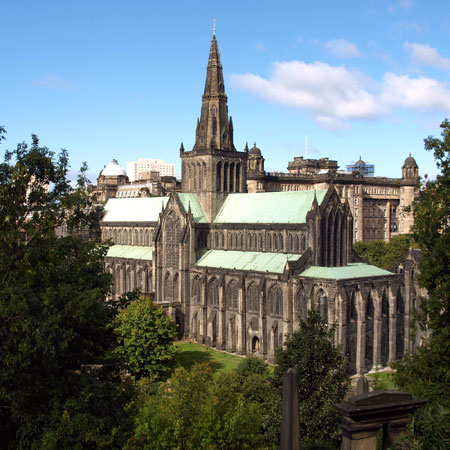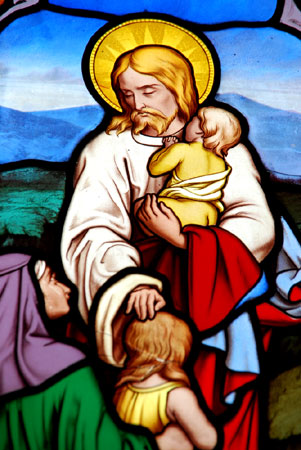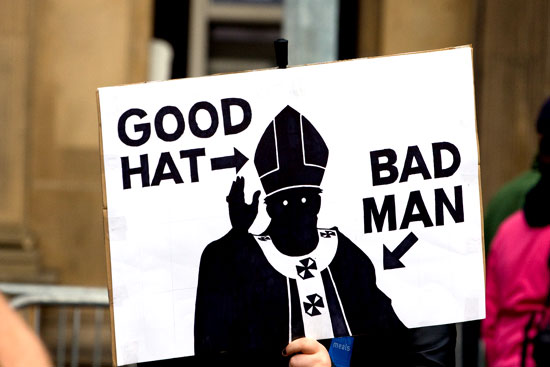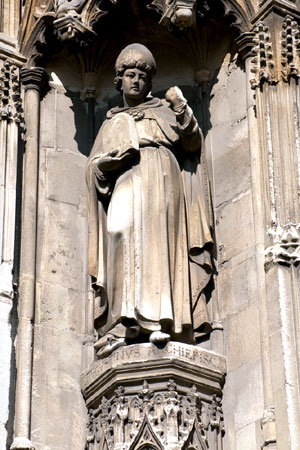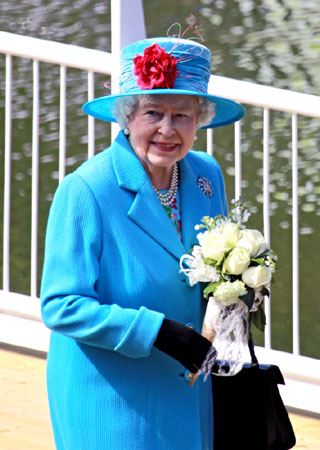Religion: Religion Overview
Religions of the Country
The United Kingdom’s population is primarily Christian. The largest religious minorities are Muslims followed by Hindus. A very small percentage of the population is equally divided between Sikhs and Jews, and the remaining approximate 10 percent is either unaffiliated to a religious organization or is atheist.
The largest Christian denomination in the United Kingdom is the Anglican Communion, which includes the country’s "established" (official state) religion of the Church of England. There are numerous other denominations including the Roman Catholics, Methodists, Lutherans, Presbyterians, Pentecostals, Calvinists, Wesleyans, and Mormons.
Basic Tenets
Christians believe that the Bible is the revealed word of God written under the inspiration of the Holy Spirit. Most Christian groups are monotheistic and trinitarian, believing that the one God is represented in three co-equal Divine Persons of Father, Son (Jesus Christ), and Holy Spirit. Christians believe that Jesus Christ, the Son, came to earth in the form of a man, died, and rose from the dead to redeem humanity from its sins.
For most Protestants, an individual’s faith in God and study of the Bible are the most important means of salvation. Roman Catholics and Orthodox Christians, however, also consider Church teachings and sacraments as valid sources of truth and grace. It is not true that Catholics worship saints and statues, but some Catholics may use images to focus their minds as they ask a favorite saint to intercede for them in heaven. Protestants consider Christ the only mediator between humanity and God and reject all other intercessors. Protestants also differ from Catholics regarding the "transubstantiation" of the communion bread and wine into the body and blood of Christ. They hold to the doctrine of Real Presence ("consubstantiation"), or the supernatural presence of the body and blood of Christ during communion.
Anglicans, also known as Episcopalians, are those who follow the concepts and traditions of the Church of England and the Anglican Communion, headed by the Archbishop of Canterbury. The Church of England was formed as a result of a separation from the Roman Catholic Church during the reign of Henry VIII. The separation was more a result of political differences than theological ones. The Church of England today is primarily Protestant in character, both in its principles as well as its rejection of Papal authority. It also considers itself Catholic, in the sense of being an unbroken continuation of the early apostolic church and not a "new formation."
The Anglican doctrine is expressed in the Book of Common Prayer, which stipulates all the necessary prayers, exhortations, and scripture readings. The fundamental principles include the Apostles' and Nicene Creeds, the Scriptures, the Sacraments, daily prayer, the catechism, and apostolic succession. Many Anglicans also believe in the Chicago-Lambeth Quadrilateral of 1888. The Quadrilateral states four points: the sufficiency of the Holy Scriptures, since it contains everything necessary for salvation; the Creeds (specifically, the Apostles' and Nicene Creeds), as they sufficiently describe Christian faith; the primary sacraments of Baptism and Holy Communion; and the historic authority of the Church.
The Church of Scotland is the national church of Scotland, although it is not a "state church" like the Church of England (i.e., it is completely independent). Known informally as the "C of S" or "The Kirk," the Church is Presbyterian and follows a "reformed" theology. The basis of faith for the Church is the Word of God, which it views as being contained in the Scriptures of the Old and New Testament. Its principal subordinate standard is The Westminster Confession of Faith of 1647. Its Book of Common Order contains recommended texts for public worship that are followed fairly closely, although preaching is emphasized in services. All ministries and leadership positions in the church are open to both men and women. In fact, the majority of ministers in training are women, and in 2004 the first woman was chosen to be Moderator of the General Assembly for the Church of Scotland.
Spiritually Devout or Nominal
Although Christianity is the predominant religion, most of the British are purely nominal in their beliefs and attach very little importance to religion. About 17 percent of the population considers religion to be one of the most significant factors in their lives, and 33 percent considers it important. Attendance levels at public worship services in the United Kingdom are among the lowest in the world, with just 8 percent of the population attending religious services on a regular basis. A large majority of this 8 percent is made up of the middle-aged and elderly.
Religious Conflict
The coexistence of the United Kingdom’s multiple religions is generally peaceful, though terrorist attacks have caused a straining of relations with the Muslim community. Northern Ireland, however, is a glaring exception, with the region having a centuries-old history of continuous religious clashes between the Catholic and Protestant communities.
Secularism
The United Kingdom is home to a few secular movements, one of which is called the National Secular Society. Even though the country is already regarded as one of the most secular in the world, these movements seek the abolition of Christianity as the official religion and the removal of all forms of public religious influence. The secular movement in the United Kingdom first gained roots in the early 20th century and solidified into a formal movement by the late 1970s.
Superstitions
Many English religious superstitions involve common household activities. For example, it was believed that washing should never be done on Good Friday, because a washerwoman mocked Christ on his way to the cross. Another common superstition is that 13 people should not sit at a table, because 13 people sat down for the Last Supper before Jesus was crucified. Other superstitions are that if you spill salt, you should throw a pinch over your left shoulder into the eyes of the Devil, and that if you cut both ends off a loaf of bread you are issuing an open invitation for a visit from the Devil.
Religious Clerics
Christian clergy in England, particularly those belonging to the Church of England, play an important role in society. While their religious duties are usually restricted to conducting services for the diminishing group of those still interested in religion, they are active in the country’s social sphere, actively campaigning against laws and policies they see as detrimental to the country’s "morals." The head of the Church of England and the leader of the Anglicans worldwide, the Archbishop of Canterbury possesses enormous authority and commands considerable respect among the ruling class and general population. In general, however, the influence of individual religious clerics is limited to their congregations.
The United Kingdom is home to numerous religious teaching institutions, affiliated with almost all Christian denominations operating in the country. Anglican seminaries include Westminster Chapel School of Theology, the Carlisle and Blackburn Diocesan Training Institute, and the Bible College of Wales. There are also a few Islamic training institutions for aspiring Muslim clerics.
State Regulations
Religious clerics, including those of the Church of England, are neither regulated nor paid by the state. The Church of England, however, enjoys various forms of indirect assistance.
Religion and Public Life
Religion plays a minor role in English society, despite the prevalence of Christian beliefs. The number of people shying away from religious matters has been steadily increasing as church attendance continues to drop. While religion does continue to hold an important position in the lives of the elderly, the younger generation has almost completely dropped any pretensions to religiousness. The practice of religious customs as a regular part of the life of the average British citizen is almost non-existent. The most important religious customs present in England are the rituals surrounding Easter and Christmas, many of which have lost their original religious significance.
Religious Holidays and Ceremonies
The religious holidays officially recognized and celebrated in the United Kingdom are Good Friday, Easter Monday, and Christmas Day, all of which are Christian holidays.
The most important religious ceremonies in British culture are baptisms, weddings, and funerals, all of which are generally conducted in the church and presided over by religious clerics. The Eucharist (communion) is an important ceremony for both Anglicans and Catholics.
Government and Religion
The Constitution of the United Kingdom allows its citizens to believe in the religion of their choice. The official state religion of England is the Anglican denomination of Christianity, and the official Church is the Church of England. The Queen holds the title of the "Supreme Governor of the Church of England," a constitutional but largely ceremonial position. The Church of England has its own ecclesiastical courts, which form a part of the legal system of the United Kingdom and whose authority is particularly over the area of churches and clergy. The separation between the church and state is not "strict," and many official functions, such as the crowning of the monarch, have Christian overtones.
The government prohibits any discrimination based on religion and generally attempts to accommodate the reasonable requests of government employees of different religions. The government also funds a number of schools belonging to non-Christian religious groups.
The government has censured certain Islamic clergy and mosques for their active support of terrorist acts and removed Sheikh Abu Hamza al-Masri from his position at the Finsbury Park mosque for this reason.
Persecution
The government does not persecute outside religions. However, the Muslim community has made accusations that the government has tended to discriminate against them since terrorist attacks in London were carried out by Muslim youth. The rules requiring female Muslim government employees not to wear the burqa (an ankle-length black covering) have been criticized by the Muslim population as infringing on their right to religious freedom.
All British citizens have the freedom to practice or convert to the religion of their choice. The laws require foreign religious ministers to have worked for at least one of the last five years as a missionary or minister. They are required to have either one year of full-time experience or two years of part-time training after their ordination. Missionaries are required to have either formal training or work experience as a missionary. All foreign missionaries and religious ministers are also required to have level four competence in the International English Language Testing System, although this can be waived at the discretion of visa adjudicators if they are satisfied with the level of the applicant’s English competency.
Religious proselytizing is legally permitted. All foreign religious groups are allowed to conduct services without government interference or supervision. The possession, distribution, sale, and display of all religious materials and items are legally permitted. However, the law specifically prohibits the publication and distribution of literature or other material that has the capability of stirring up religious hatred or that offends the sensitivities of a particular religious group.
Religious Tolerance
The United Kingdom, with the exception of Northern Ireland, is highly tolerant of various religious groups and communities. The Northern Ireland region, however, has witnessed a religious conflict between the Catholic and Protestant communities that has gone on for centuries. Instigated by the concerted migration of Protestants from England and Scotland in the seventeenth century, and by the North’s vote for partition from the rest of Ireland in 1921, this long-standing dispute has claimed the lives of tens of thousands of Protestants and Catholics. Efforts for a peaceful resolution appear to be making some progress.
The Muslim community in England has experienced a rise in negative attitudes in the wake of worldwide terrorist incidents carried out by Muslims and the domestic bombings executed by England’s own Muslim citizens. Incidents of harassment have included several serious violent acts.
Foreign missionaries and evangelical groups are allowed to operate freely in the country and do not face opposition or harassment from the local population. Religious proselytizing is culturally accepted and widely practiced.
Protocols for Foreigners
Foreigners are allowed to participate in the country’s religious activities and festivals without any restrictions.
Copyright © 1993—2024 World Trade Press. All rights reserved.

 United Kingdom
United Kingdom 